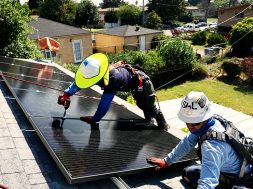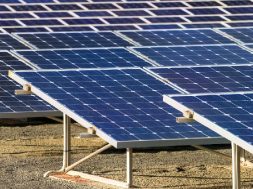
When the colour of milk is green
Hatsun Agro’s aggressive clean tech thrust is paying off
In 2007, two young researchers from Massachusetts Institute of Technology, Boston, Sorin Grama and Sam White, spent two weeks in Tamil Nadu to study operations of ice-cream and milk producer, Hatsun Agro. The company needed power to chill milk and faced a problem. The grid power was erratic, the stand-by diesel power was costly. Taking the problem as their project, Sorin and Sam came up with an idea, which was novel at that time: solar.
They put it up to R G Chandramogan, the founder of Hatsun and the company’s Chairman and Managing Director, who wrote out a cheque for $5,000 for them to develop a solar-powered milk chilling system. The young men developed a technically sound solution, but it was not economically viable. “We wrote-off the $5,000 without regret,” recalls Chandramogan.
But, as it turned out, the money didn’t go waste. Not willing to give up, Sorin and Sam developed a contrivance for chilling milk, which is today a big help for Hatsun apart from being good business to the company they set up, the Pune-based Promethean Power Systems.
The device is called ‘thermal batteries’, the heart of which is ‘phase changing materials’. The PCMs get super-cooled with electricity and releases the ‘cold’ for many hours after. (The simplest PCM is water — cool it to ice, and you can tap the cold for a long time.)
Promethean has sold around 600 thermal batteries to Hatsun over the last five years, ₹10 lakh apiece. While Hatsun was its first (and major) customer, it also counts among its customers, marquee names such as Amul, Mother Dairy and Heritage.
For the ₹4,200-crore Hatsun, whose business is growing 18 per cent annually, the thermal batteries are a boon. Some three lakh farmers bring their milk from 30 lakh animals to one of the 10,500-odd collection centres of the company, which is picked up by milk tankers and taken to a bulk chilling centre twice a day. With the thermal batteries, the company can chill milk right at the collection centre, which has two advantages.
First, the milk is cooled sooner, therefore the quality is better. Second, it eases the pressure on the farmers who don’t have to rush in their supplies in time to catch the tankers, which strengthens their relationship with the company. Hatsun intends to buy another 1,400-odd thermal batteries.
Going clean
The diesel-replacing thermal batteries is but one example of how Hatsun Agro is going clean tech in its operations. From wind power, to rooftop solar plants, to micro rooftop solar plants to run milk testing machines, to solar-powered hot water plants to hi-tech ‘thermal stratification tank’, which is built for it by Bosch at its facilities at Kanchipuram, near Chennai, Hatsun Agro is going aggressively into green technology.
The capacity of 500-kilowatt rooftop solar plant at Hatsun’s huge, ₹80-crore cattle feed plant near the township of Palani, Tamil Nadu, is being doubled. Micro solar plants are being put up on the roofs of its 10,500 collection centres to power the milk testing machines, whose up-time is critical. These machines (take a minute to) analyse the quality of milk supplied and calculate the payment to the farmer. Hence, the farmer knows exactly how much he gets and why, and the money is credited to his bank account once in ten days.
At its Salem plant, solar collectors on the roof produce hot water for cleaning tanks. This collector system, supplied by a company called Sun Best, was installed a year back and would be fully paid-back in another year. Then, Hatsun would get free hot water for the next 20 years. A German company called Protarget has put up a solar parabolic mirror plant near Hatsun’s ice-cream factory near Salem, and sells steam to Hatsun.
J Prasanna Venkatesh, Associate Vice President – Marketing & Sales, says the company today meets 92 per cent of its electricity demand from renewable sources. This number would go up to 97 by March. However, if energy needs in all forms is considered, a third of the demand is met by renewable sources.
Chandramogan has his eyes set on a slot in “RE 100”, a global group of companies that get all their energy from renewable sources. His next plan is to go for lithium-ion batteries for diesel replacement. As the diesel gen sets are being put out of use, “we are the largest sellers of used diesel generator sets in the country,” observes Venkatesh.















